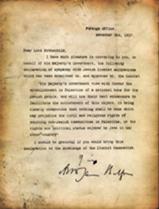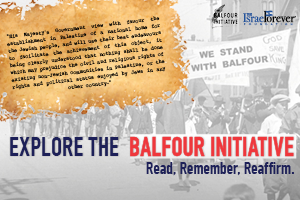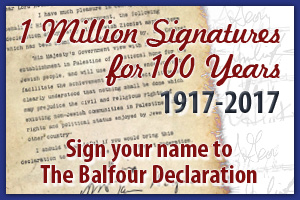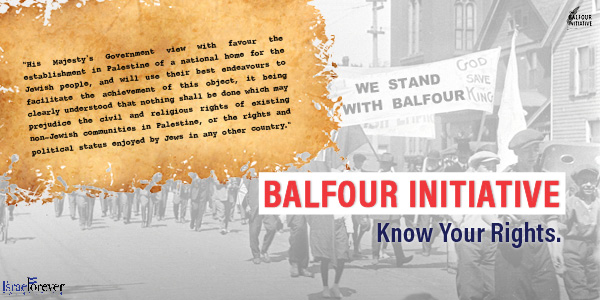Reflections on a Creative Stateman: Moshe Sharett on Chaim Weizman and Path to Balfour
The late Moshe Sharett was in a position to appreciate Weizmann’s qualities as a statesman. Here are some of his comments made in a speech delivered on the 10th anniversary of Weizmann’s death in 1962.
By Moshe Sharett
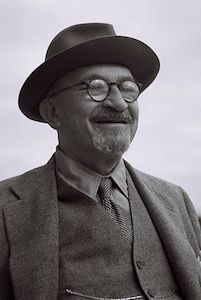
Chaim Weizmann
The revival of Eretz Israel as a single geopolitical entity is a result of the Zionist policy, which was adopted by the British Government.
Eretz Israel has acquired unique political significance only thanks to the recognition extended to the Jewish people in relation to its land and to this land in its relation to the Jewish people, as the anvil upon which its liberation was to be forged. The historic bond between the Jewish people as a world-political entity and this country was acknowledged.
I think that only if we make the effort and cast our minds back to the situation that existed prior to the Balfour Declaration, only then can we perhaps grasp the vast extent, the colossal impact of the transformation that was wrought in our status and our prospects for the future; only then can we fully appreciate the magnitude of the achievement.
It was, after all, a major innovation in international law. It amounted to the introduction of basic concepts of political Zionism into the framework of the laws of nations, and the inclusion of these concepts within the political consciousness of the world.
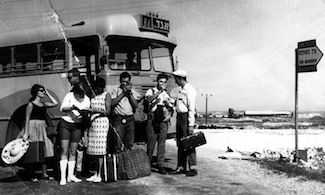
But had there been no immigration to Eretz Israel, the Declaration would never have been possible, it would not even have been conceivable. For, how could England be sure that the Jews wanted Eretz Israel, that they were capable of returning to Eretz Israel, of settling and reviving the country? A small Jewish population, some two dozen villages, one Jewish townlet, a suburb of Haifa, a few quarters in Jerusalem, a sparse school network, the “Hashomer” watchman’s organization as the nucleus of a Jewish armed force, a Jewish language spoken mainly by schoolchildren - all these laboratory experiment.
But qualitatives analysis need not depend on large quantities of the material examined. A small-scale test is quite enough. That test tipped the scales: it proved the people’s need for its country and its capacity to bring the land back to life.
It was not only the solid achievement, the immigrants and the work that laid the groundwork for the movement which eventually changed the fortunes of the Jewish people after the Balfour Declaration and the League of Nations assigned the mandate over Palestine to Britain. Hand in hand went the daring political action carried out by people who operated abroad, and who were not even organically connected with our work here.
Chaim Weizmann was not only a fighting statesman, a conquering statesman, a defending statesman. On the homefront he was a building statesman. He was the builder of the State. He once said- before the Balfour Declaration, if I am not mistaken - that we cannot simply talk Heaven into dropping a Jewish State into our laps. A Jewish State cannot rise overnight. It must be made to grow through daily toil, an effort of output and gathering strength. Chaim Weizmann had a biological-organic view of the process of national renascence, opposed to the mechanistic view which many great figures in our history affected. His conception was one of increase and growth, of tending the shoots sprouting from the depths of the people’s soul. The mechanistic approach, let us admit, was the failing of Herzl’s political genius and also, perhaps, of many other passionate political Zionists who came after him.
Weizmann the statesman did not lock himself into the ivory tower of pure diplomacy. He took the wanderer’s staff, put his knapsack on and went out to arouse the Jewish people throughout the countries of the dispersion urging them to make the utmost of the historic opportunity they were being offered. Once I remember, after he had testified before the Peel Commission and was about to leave for England, we were travelling by train through the Sharon. Right and left of us there were orange groves in full bloom. He looked through the window and said: “There is a Balfour Declaration at the root of each tree.”
But he did not think he had completed his task by securing the Balfour Declaration.
He saw to it that the tree should be planted.
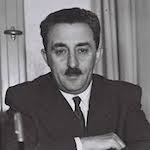
Moshe Sharett was the second Prime Minister of Israel, serving for a little under two years between David Ben-Gurion's two terms. He continued as Foreign Minister in the Mapai government.

